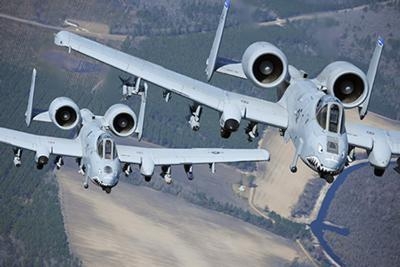Mon, Nov 10, 2014
Persistent Close Air Support Designed To Speed Close Air Support To Ground Troops
Raytheon has begun flight testing DARPA's Persistent Close Air Support (PCAS) program. PCAS Phase 3 is an 18-month, $25.5 million effort scheduled to culminate in live-fire demonstrations. The program is designed to speed close air support to soldiers on the battlefield.

"PCAS will help reduce close air support response times from as long as one hour to just six minutes," said Tom Bussing, Raytheon vice president of Advanced Missile Systems. "By delivering critical information to decision makers more quickly, PCAS will save lives in the battlespace."
PCAS will enable ground troops, Joint Terminal Attack Controllers (JTACs) and combat aircrews to share real-time situational awareness and weapons systems data. With PCAS, soldiers on the battlefield can quickly and positively identify multiple targets simultaneously. JTACs and aircrews will jointly select the best precision-guided weapons for each target while minimizing collateral damage and friendly fire.
Current flight testing will highlight PCAS-air performance on an A-10 Thunderbolt aircraft and connectivity with the JTAC equipped with a PCAS-ground kit. The key element of PCAS-air is modular smart launcher electronics, which can be easily ported from one platform to another.
Once flight testing is complete, the PCAS system will be available for integration with other aircraft and participation in other demonstrations. Digital interoperability between platforms and JTACs will allow for increased situational awareness, improved coordination, and decreased timelines for close air support.
Raytheon is the systems integrator for PCAS and leads an industry team comprised of Rockwell Collins, General Electric, BAE Systems and 5-D Systems. Raytheon brings its expertise in overall systems integration, weapons, aircraft integration and unmanned aircraft system ground control stations to PCAS.
(A-10 Thunderbolt image from file)
More News
From 2023 (YouTube Version): Legacy of a Titan Robert (Bob) Anderson Hoover was a fighter pilot, test pilot, flight instructor, and air show superstar. More so, Bob Hoover was an i>[...]
Get The Latest in Aviation News NOW on Instagram Are you on Instagram yet? It's been around for a few years, quietly picking up traction mostly thanks to everybody's new obsession >[...]
Aero Linx: B-52H Stratofortress The B-52H Stratofortress is a long-range, heavy bomber that can perform a variety of missions. The bomber is capable of flying at high subsonic spee>[...]
Altimeter Setting The barometric pressure reading used to adjust a pressure altimeter for variations in existing atmospheric pressure or to the standard altimeter setting (29.92).>[...]
"Knowing that we play an active part in bettering people's lives is extremely rewarding. My team and I are very thankful for the opportunity to be here and to help in any way we ca>[...]
 Classic Aero-TV: Remembering Bob Hoover
Classic Aero-TV: Remembering Bob Hoover ANN FAQ: Follow Us On Instagram!
ANN FAQ: Follow Us On Instagram! ANN's Daily Aero-Linx (05.15.24)
ANN's Daily Aero-Linx (05.15.24) ANN's Daily Aero-Term (05.15.24):Altimeter Setting
ANN's Daily Aero-Term (05.15.24):Altimeter Setting Aero-News: Quote of the Day (05.16.24)
Aero-News: Quote of the Day (05.16.24)



